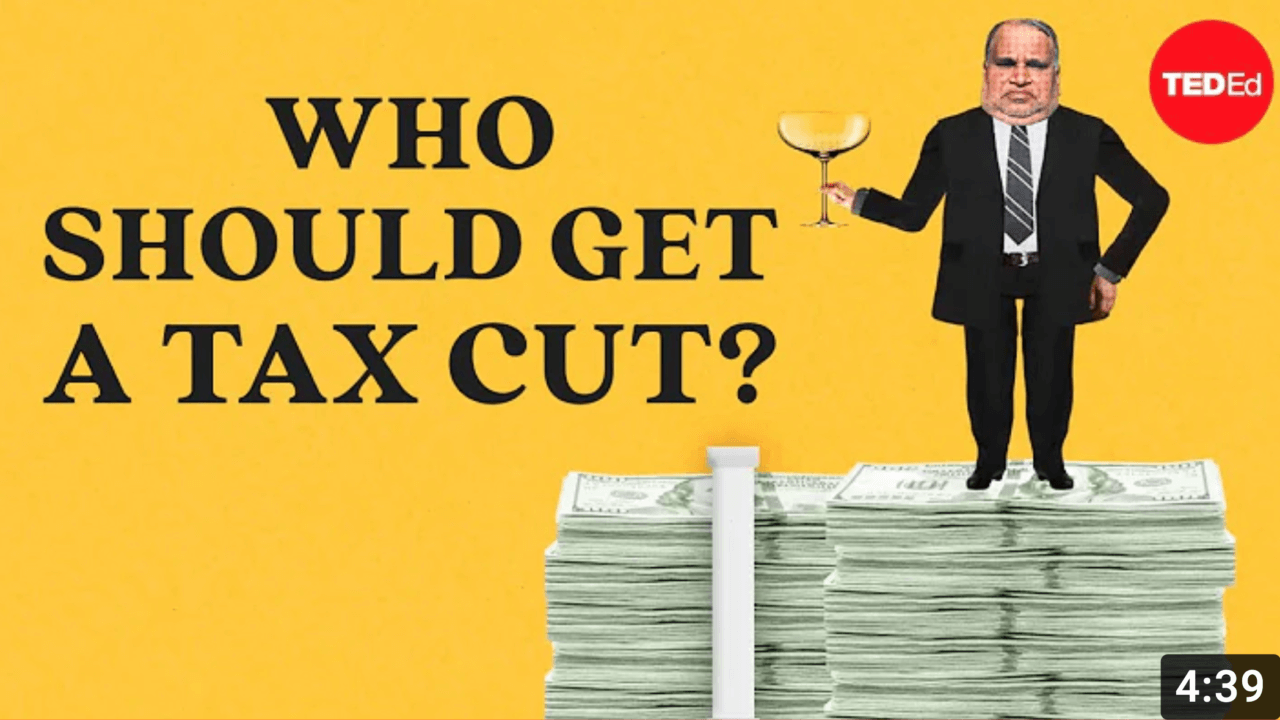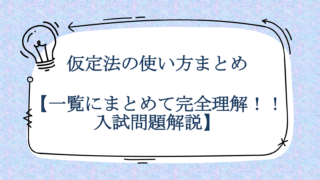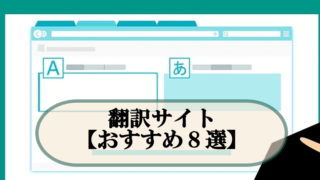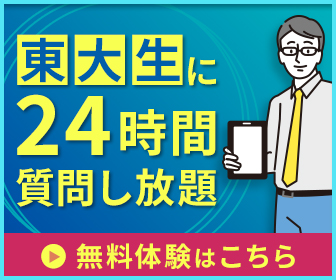今回は”トリクルダウン経済”についての動画です。
トリクルダウン経済とは「富める者が富めば、貧しい者にも自然に富がこぼれ落ち、経済全体が良くなる」とする経済理論です。
「お金持ちの税金を削減して、お金持ちがいっぱいお金を使ってくれれば、貧しい人にもお金が回ってくる」という考えですが、皆さんはどう思いますか?
自分の考えを先に書き出してから動画をみると、より考えが深まるので、ぜひ考えてみてください。
英文
0:06
When President Ronald Reagan began his first term in 1981, the US economy was struggling. Unemployment rates were high and getting higher and the 1979, inflation had peaked at an all-time high for peacetime. In an effort to combat these issues, Reagan’s Administration introduced a number of economic policies, including tax cuts for large corporations and high income earners. The idea was that tax savings for the rich would cause extra money to trickle down to everyone else and for that reason, these policies are often referred to as trickle-down economics.
0:45
From the 80s to the late 90s, the US saw one of its longest and strongest periods of economic growth in history. Median income rose, as did rates of job creation. Since then, many politicians have invoked trickle-down theory as a justification for tax cuts. But did these policies actually work, either in the sense of stimulating economic growth or in terms of improving circumstances for Americans? Would they work in other circumstances?
1:15
To answer these questions, the main things to consider are whether the impact of a tax cut on the government tax revenue is harmful, whether the money saved in taxes actually stimulates the economy, and whether stimulating the economy actually improves people’s lives.
1:32
The idea behind tax cuts is if taxes are too high people will be less willing to work, which would ultimately decrease tax revenue. So at a lower tax rate, the government might actually gain more tax money that it can theoretically put towards improving life for its citizens because people will work more when they get to keep more of their earnings. Of course, there’s a limit to how much the government can cut taxes: at a zero tax rate, there is no tax revenue regardless of how much people are working. So while cuts from a very high tax rate might be fine, cuts from a lower tax rate might be counterproductive. hampering the government’s ability to accomplish crucial things.
2:14
Tax rates were extremely high when Reagan took office. His administration cut the highest income tax bracket from 70% to 28% and corporate tax from 48% to 34%. By comparison, as of early 2021, those rates were 37% and 21% respectively. When tax rates are lower, tax cuts for the wealthy can be harmful.
2:39
For example, in 2012 to 13 lawmakers cut the top tax rate in the state of Kansas by almost 30% and reduced some business tax rates to zero. As a result, the government balance sheet immediately fell into negative territory and did not recover, implying that wealthy individuals and companies did not invest back into the economy. In short, the money did not trickle down.
3:05
This appears to be a trend: in a study over multiple periods of history and across 18 countries, The London school of economics found that cutting taxes increased the wealth of the top 1% of people, but had a little effect on the economy as a whole. In order for tax cuts for the rich to truly stimulate the economy, they would have to spend the saved money, putting it back into, for example, local businesses but this isn’t what happens in practice.
3:34
No economic policy operates in isolation: each time and place is unique with multiple policies in place simultaneously so there is only ever one test case for each set of scenarios. This makes it difficult to deliver definitive rulings on whether an economic policy worked, whether something else might’ve worked better, or whether it would work in a different situation. And yet, rhetoric around trickle-down economics, both during the Reagan era and since, often promises something definitive: Its spending by society’s richest members on things other than taxes directly improves the financial circumstances of the less wealthy. And there’s not much evidence to support that.
日本語訳
0:06
1981年、レーガン大統領が1期目を始めた頃、アメリカ経済は苦境に立たされていた。失業率は高く、さらに上昇し、1979年のインフレ率は平時としては過去最高を記録していた。こうした問題に対処するため、レーガン政権は、大企業や高額所得者への減税をはじめとする数々の経済政策を導入した。このため、これらの政策はしばしば「トリクルダウン経済学」と呼ばれる。
0:45
80年代から90年代後半にかけて、アメリカは歴史上最も長く、力強い経済成長期を迎えた。所得の中央値は上昇し、雇用の創出率も上昇した。それ以来、多くの政治家が減税を正当化するためにトリクルダウン理論を持ち出してきた。しかし、これらの政策は、経済成長を刺激するという意味でも、アメリカ人の状況を改善するという意味でも、実際に効果があったのだろうか?
1:15
これらの問いに答えるためには、減税が政府の税収に与える影響は有害かどうか、節税したお金が実際に経済を活性化するかどうか、経済を活性化することで実際に人々の生活が改善されるかどうかが主な検討材料になる。
1:32
減税の背後にある考え方は、税金が高すぎると人々は働く意欲を失い、結果的に税収が減るというものである。だから税率が低ければ、政府は理論的には国民の生活向上に回すことができる税金を実際に多く得ることができるかもしれない。もちろん、減税にも限度がある。税率がゼロの場合は、人々がどれだけ働いても税収はゼロである。ですから、非常に高い税率からの減税は問題ないかもしれませんが、低い税率からの減税は逆効果になるかもしれません。
2:14
レーガンが大統領になったとき、税率は非常に高かった。彼の政権は、所得税の最高税率を70%から28%に、法人税を48%から34%に引き下げた。それに比べて、2021年初頭の時点で、これらの税率はそれぞれ37%と21%だった。税率が低くなると、富裕層への減税は有害となる。
2:39
例えば、2012年から13年にかけて、議員たちはカンザス州の最高税率をほぼ30%引き下げ、一部の事業税率をゼロにした。 その結果、政府のバランスシートはたちまちマイナスに陥り、回復しなかった。これは、富裕層の個人や企業が経済に投資を戻さなかったことを暗示している。要するに、お金はトリクルダウンしなかったのである。
3:05
これは傾向のようだ。ロンドン大学経済学部は、歴史の複数の期間と18カ国にわたる研究で、減税は上位1%の人々の富を増やすが、経済全体にはほとんど影響を及ぼさないことを明らかにした。富裕層への減税が本当に経済を刺激するためには、節約したお金を使い、例えば地元のビジネスに還元しなければならないが、実際にはそうなっていない。
3:34
経済政策は単独では機能しない。それぞれの時代と場所で、同時に実施される複数の政策は特有のものなので、あるシナリオごとにテストケースは1つしかない。このため、ある経済政策がうまくいったかどうか、他の政策がもっとうまくいったかどうか、あるいは別の状況でもうまくいくかどうかについて、決定的な裁定を下すことは難しい。しかし、レーガン政権時代から現在に至るまで、トリクルダウン経済に関するレトリックは、しばしば決定的なことを約束している。社会の最も裕福な人々が税金以外のものに支出することで、それほど裕福でない人々の経済状況が直接改善されるというものだ。しかし、それを裏付ける証拠はあまりない。
解説 (単語や表現を確認する)
0:06
1) When President Ronald Reagan began his first term in 1981, the US economy was struggling.
1981年、レーガン大統領が1期目を始めた頃、アメリカ経済は苦境に立たされていた。
・President Ronald Reagan レーガン大統領
・term(名) : (一定の)期間
・economy(名) 経済
・strugle(動) 苦しむ
2) Unemployment rates were high and getting higher and by 1979, inflation had peaked at an all-time high for peacetime.
失業率は高く、さらに上昇し、1979年のインフレーションは平時としては過去最高を記録していた。
・Unemployment rates(名) 失業率
・inflation(名) インフレーション (モノの値段が上がり、お金の価値が下がること)
・peak(動) 最高[最大限]になる、ピークに達する
・all-time(形) 過去最高の
・peacetime(名) 平時
3) In an effort to combat these issues, Reagan’s Administration introduced a number of economic policies, including tax cuts for large corporations and high income earners.
こうした問題に対処するため、レーガン政権は、大企業や高額所得者への減税をはじめとする数々の経済政策を導入した。
・in effort to do : 〜するために(〜しようと努力して)
・combat(動) 対処する
・issue(名) 問題
・administration(名) 政権
・introduce(動) 導入する
・a number of 〜 : 多くの〜、数々の〜
・high incomes earner(名) 高所得者
4) The idea was that tax savings for the rich would cause extra money to trickle down to everyone else and for that reason, these policies are often referred to as trickle-down economics.
富裕層の節税により、余分なお金がみんなに行き渡るという考えから、これらの政策はしばしばトリクルダウン経済学と呼ばれる。
・tax savings(名) 節税
・the rich(名) 富裕層
・cause O to do : Oが〜する原因となる
・trickle down:したたり落ちる (ここでは人々に”行き渡る”という意味で使われています。)
・be referred to as 〜 :〜と呼ばれる
・trickle-down economics(名詞)トリクルダウン経済(トリクルダウン経済とは。富める者が富めば、貧しい者にも自然に富がこぼれ落ち、経済全体が良くなる」とする経済理論である。)
0:45
5) From the 80s to the late 90s, the US saw one of its longest and strongest periods of economic growth in history.
80年代から90年代後半にかけて、アメリカは歴史上最も長く、力強い経済成長期を迎えた。
・economic growth (名) 経済成長
6) Median income rose, as did rates of job creation.
所得の中央値は上昇し、雇用の創出率も上昇した。
・median(名) 中央値
・income(名) 所得
・job creation(名) 雇用の創出
7) Since then, many politicians have invoked trickle-down theory as a justification for tax cuts.
それ以来、多くの政治家が減税を正当化するためにトリクルダウン理論を持ち出してきた。
・politician (名) 政治家
・invoke (動) 引き合いに出す
・justification (名) 正当化
・tax cuts (名) 減税
8) But did these policies actually work, either in the sense of stimulating economic growth or in terms of improving circumstances for Americans?
しかし、これらの政策は、経済成長を刺激するという意味でも、アメリカ人の状況を改善するという意味でも、実際に効果があったのだろうか?
・in the sense of 〜 : 〜という意味で
・stimulate(動) 刺激する
・in terms of 〜 : 〜という点で
・improve(動) 改善する
・circumstances(名) 状況
9) Would they work in other circumstances?
それらは他の状況でも通用するのだろうか?
1:15
10) To answer these questions, the main things to consider are whether the impact of a tax cut on the government tax revenue is harmful, whether the money saved in taxes actually stimulates the economy, and whether stimulating the economy actually improves people’s lives.
これらの問いに答えるためには、減税が政府の税収に与える影響は有害かどうか、節税したお金が実際に経済を活性化するかどうか、経済を活性化することで実際に人々の生活が改善されるかどうかが主な検討材料になる。
・whether ~ (接) ~かどうか
・tax revenue(名) 税収
・harmful(形) 有害
・stimulate(動) 刺激する
・improve(動) 改善する
1:32
11) The idea behind tax cuts is if taxes are too high, people will be less willing to work, which would ultimately decrease tax revenue.
減税の背後にある考え方は、税金が高すぎると人々は働く意欲を失い、最終的に税収が減少するというものだ。
・be willing to do (形) 〜する気がある
・ultimately(副) 最終的に
・decrease(動) 減少する
・tax revenue(名) 税収
12) So at a lower tax rate, the government might actually gain more tax money that it can theoretically put towards improving life for its citizens because people will work more when they get to keep more of their earnings.
だから低い税率で、自分の稼ぎをより多く残すことができるようになったとき、政府は理論的には国民の生活向上に回すことができる税金を実際に多く得ることができるかもしれない。
・gain(動) 得る
・theoretically(副) 理論的に
・put A toward B(熟) A(金銭)をB(事)にまわす(使う)
・citizens(名) 国民
・more of ~ : より多くの〜
13) Of course, there’s a limit to how much the government can cut taxes: at a zero tax rate, there is no tax revenue regardless of how much people are working.
もちろん、減税にも限度がある。税率ゼロでは、人々がいくら働いても税収はゼロである。
・regardless of 〜: ~にかかわらず、~に関係なく
14) So while cuts from a very high tax rate might be fine, cuts from a lower tax rate might be counterproductive, hampering *the government’s ability to accomplish crucial things.
つまり、非常に高い税率による削減は良いかもしれないが、低い税率による削減は、 政権担当能力を阻害し、逆効果になる可能性があるのだ。
・while(接) : 〜だけど
・counterproductive(形) 逆効果になる
・hamper(動) 妨げる、阻害する
・accomplish(動) 成し遂げる
・crucial(形) 重要な
*the government’s ability to accomplish crucial things
➡︎ 直訳すると「重要なことを達成する政府の能力」ですが、「政権担当能力」と訳しました。政権担当能力とは「政権が政策を実現するための能力」です。
2:14
15) Tax rates were extremely high when Reagan took office.
レーガンが大統領になったとき、税率は非常に高かった。
・extremely (副) 極度に、非常に
・take office: 就任する、政権を握る
His administration cut the highest income tax bracket from 70% to 28% and corporate tax from 48% to 34%.
彼の政権は、最高所得税額を70%から28%に、法人税を48%から34%に引き下げた。
・corporate tax(名) 法人税
16) By comparison, as of early 2021, those rates were 37% and 21% respectively.
それに比べて、2021年初頭の時点で、これらの税率はそれぞれ37%と21%だった。
・by comparison(熟) 比較すると
・respectively(副) それぞれ
17) When tax rates are lower, tax cuts for the wealthy can be harmful.
税率が低くなると、富裕層への減税は有害となる。
・the wealthy(名) 富裕層
・harmful(形) 有害
2:39
18) For example, in 2012 to 13, lawmakers cut the top tax rate in the state of Kansas by almost 30% and reduced some business tax rates to zero.
例えば、2012年から13年にかけて、議員たちはカンザス州の最高税率をほぼ30%削減し、一部の事業税率をゼロにした。
・lawmaker(名) 議員
・reduce A to B : AをBに引き下げる
・business tax(名) 事業税
19) As a result, the government balance sheet immediately fell into negative territory and did not recover, implying that wealthy individuals and companies did not invest back into the economy.
その結果、政府のバランスシートはたちまちマイナスに陥り、回復しなかった。これは、富裕層の個人や企業が経済に投資を戻さなかったことを暗示している。
・As a result(副) 結果として
・balance sheet(名) バランスシート (バランスシートとは収入と支出のバランスをまとめた書類)
・fall into ~(熟) 〜に陥る
・imply(動) 暗示する
・invest(動) 投資する
In short, the money did not trickle down.
要するに、お金は行き渡らなかったのである。
・In short : 要するに
・trickle down:したたり落ちる (ここでは人々に”行き渡る”という意味で使われています。)
3:05
20) This appears to be a trend:
これは傾向のようだ。
・appear to do: 〜するようだ
21) In a study over multiple periods of history and across 18 countries, The London school of economics found that cutting taxes increased the wealth of the top 1% of people, but had little effect on the economy as a whole.
ロンドン大学経済学部は、歴史の複数の期間と18カ国にわたる研究で、減税は上位1%の人々の富を増やすが、経済全体にはほとんど影響を及ぼさないことを発見した。
・study(名) 研究
・multiple(形) 複数の
・little(形) ほとんど〜ない
・have an effect on ~ : 〜に影響を及ぼす
・as a whole : 全体として
22) In order for tax cuts for the rich to truly stimulate the economy, they would have to spend the saved money, putting it back into, for example, local businesses but this isn’t what happens in practice.
富裕層への減税が本当に経済を刺激するためには、節約したお金を使い、例えば地元のビジネスに還元しなければならないが、実際にはそうなっていない。
・In order for A to do : Aが〜するために
・saved money: 節税したお金
・put A back into B: AをBに還元する
・in practice: 実際には
3:34
23) No economic policy operates in isolation: each time and place is unique with multiple policies in place simultaneously so there is only ever one test case for each set of scenarios.
経済政策は単独では機能しない。それぞれの時代と場所で、同時に実施される複数の政策は特有のものなので、あるシナリオごとにテストケースは1つしかない。
・operates(動) 機能する
・in isolation : 単独で
・in place : 実施される、実行される、導入される
・simultaneously(副) 同時に
・test case: テストケース (初めての試みとなるもの)
24) This makes it difficult to deliver definitive rulings on whether an economic policy worked, whether something else might’ve worked better, or whether it would work in a different situation.
このため、ある経済政策がうまくいったかどうか、他の政策がもっとうまくいったかどうか、あるいは別の状況でもうまくいくかどうかについて、決定的な裁定を下すことは難しい。
・deliver(make) a ruling on ~ : ~に裁定を下す
・definitive(形) 決定的な
・rulings(名) 裁定
・whether ~ (接) 〜かどうか
25) And yet, rhetoric around trickle-down economics, both during the Reagan era and since, often promises something definitive:
しかし、レーガン政権時代から現在に至るまで、トリクルダウン経済に関するレトリックは、しばしば決定的なことを約束している。
・rhetoric(名) レトリック (「実質を伴わない表現上だけの言葉」のことです。この場合は、言葉の表面だけは美しいものの、中身が伴っていないというネガティブなニュアンス )
・trickle-down economics(名詞)トリクルダウン経済(トリクルダウン経済とは。富める者が富めば、貧しい者にも自然に富がこぼれ落ち、経済全体が良くなる」とする経済理論である。)
・during(前) 〜の間
・since(前) 〜以来
・definitive(形) 決定的な
26) Its spending by society’s richest members on things other than taxes directly improves the financial circumstances of the less wealthy. And there’s not much evidence to support that.
社会の最も裕福な人々が税金以外のものに支出が、それほど裕福でない人々の経済状況が直接改善されるというものだ。しかし、それを裏付ける証拠はあまりない。
・spending (名) 支出
・other than 〜 : 〜以外
・improve (動) 改善する
・financial (名) 経済、財政
・circumstance (名) 状況
・the less wealthy (名) 裕福でない人々 ( less = 〜ない )













